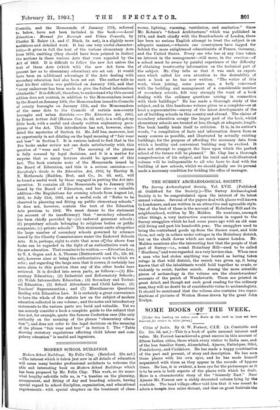SOME BOOKS OF THE WEEK.
[Under this heading we notice such Books of the week as haw not been reserved fur review is other forms.] Cities of India. By G. W. Forrest, C.I.E. (A. Constable and Co. 10s. 6d. net.)—This is a book of quite unusual interest and value. Mr. Forrest has achieved a great success in this account of fifteen Indian cities, those which every visitor to India sees, and of the less familiar Surat, Ahmedabad, Ajmere, Fattehpur, Sikri, Pondicherry, and Cuddalore. He has made a happy combination of . the past and present, of story and description. He has seen these places with his own eyes, and he has made himself acquainted with them as they appear in the records of bygone times. He has, it is evident, a keen eye for the picturesque as it is to be seen in both aspects of the places with which he deals. Here is a characteristic story of the "leisurely East." Near Ajmere Mr. Forrest saw a richly decorated column lying by the roadside. The head village officer told him that it was meant to adorn &temple ,two miles distant, and that on great festivals the villagers dragged it on its way. "Oh ! Sahib," he went on, " in my lifetime they have moved it a hundred yards,"—he was fifty. A Brahman priest improved the occasion. " You English are in such a hurry. Others have come and gone their way, and so you will go. But the pillar will reach the temple." When we get to Jeypore we are told the wonderful story of Jey Sing II., called Siwai because he was to other men as one and a quarter is to one,—a curious instance of realism. Jey Sing was a great astronomer, and the present inheritor of his dominion has had the good taste to restore his observatory. Later on we have the story of the Queen of Ganore. Compelled to wed her Moslem conqueror, she imitated the arts of Medea,—only it was herself and her bridegroom whom she enveloped with the poisoned robes. Of all the descriptive chapters there is none more charming than " Pondicherry." Here, too; history adds its attraction to the account. And the history is all the more interesting because the place reminds us how at one time it was almost on the cast of the dice whether the Indian Empire was to be French or English. Mr. Forrest goes a little astray in one of his allusions. "As we neared a village we fled past many a lodge in a garden of cucumbers, and the daughter of Zion was standing at the door." He means to suggest a picture of rustic peace. The prophet had in his mind a scene of desola- tion. Jerusalem, the daughter of Zion, was alone in a desolated land, a garden of cucumbers from which the fruit had been picked, and which was a mere waste of rotting leaves.











































 Previous page
Previous page